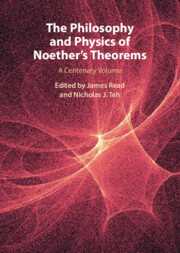Book contents
- Frontmatter
- Contents
- Contributors
- Introduction
- 1 The Noether Theorems in Context
- 2 Felix Klein and Emmy Noether on Invariant Theory and Variational Principles
- 3 Moscow, Oxford, or Princeton: Emmy Noether’s Move from Göttingen (1933)
- 4 Getting to the Bottom of Noether’s Theorem
- 5 BV Quantisation in Perturbative Algebraic QFT: Fundamental Concepts and Perspectives
- 6 Divergence Invariant Variational Problems
- 7 Do Symmetries ‘Explain’ Conservation Laws? The Modern Converse Noether Theorem vs Pragmatism
- 8 Noether’s First Theorem and the Energy-Momentum Tensor Ambiguity Problem
- 9 Noether’s Theorems and Energy in General Relativity
- 10 Geometric Objects and Perspectivalism
- 11 Substantive General Covariance and the Einstein–Klein Dispute: A Noetherian Approach
- 12 Noether Charges, Gauge-Invariance, and Non-Separability
- 13 Observability, Redundancy, and Modality for Dynamical Symmetry Transformations
- 14 The Gauge Argument: A Noether Reason
- Index
10 - Geometric Objects and Perspectivalism
Published online by Cambridge University Press: 22 September 2022
- Frontmatter
- Contents
- Contributors
- Introduction
- 1 The Noether Theorems in Context
- 2 Felix Klein and Emmy Noether on Invariant Theory and Variational Principles
- 3 Moscow, Oxford, or Princeton: Emmy Noether’s Move from Göttingen (1933)
- 4 Getting to the Bottom of Noether’s Theorem
- 5 BV Quantisation in Perturbative Algebraic QFT: Fundamental Concepts and Perspectives
- 6 Divergence Invariant Variational Problems
- 7 Do Symmetries ‘Explain’ Conservation Laws? The Modern Converse Noether Theorem vs Pragmatism
- 8 Noether’s First Theorem and the Energy-Momentum Tensor Ambiguity Problem
- 9 Noether’s Theorems and Energy in General Relativity
- 10 Geometric Objects and Perspectivalism
- 11 Substantive General Covariance and the Einstein–Klein Dispute: A Noetherian Approach
- 12 Noether Charges, Gauge-Invariance, and Non-Separability
- 13 Observability, Redundancy, and Modality for Dynamical Symmetry Transformations
- 14 The Gauge Argument: A Noether Reason
- Index
Summary
This chapter considers the metaphysics of geometric and non-geometric objects as they appear in physical theories such as general relativity, and the interactions between these considerations and the contemporary doctrines of perspectivalism and fragmentalism in the philosophy of science. Taking (following Quine) a kind’s being associated with a projectable predicate as a necessary condition for its being natural, there is a sense in which geometric objects can be assimilated to natural kinds but non-geometric objects cannot; this affords a rational reconstruction of philosophers’ and physicists’ suspicion of the latter (although this verdict can also be questioned). Even granting this, non-geometric objects can nevertheless represent real quantities in a perspectival sense-this is one way in which the perspectival realism doctrine can be endorsed. Moreover, recognising that non-geometric objects can represent real quantities in a perspectival sense affords support for fragmentalism: the view (at least in part) that frame-dependent effects are physically real. That said, one can argue that perspectivalism is superior to fragmentalism. In one sense, perspectivalism should be congenial to proponents of the ‘dynamical approach’ to spacetime theories-however, the pairing is imperfect. Endorsing perspectivalism/fragmentalism in this sense does not commit one to endorsing related-but arguably more opaque-‘structuralist’ views.
Information
- Type
- Chapter
- Information
- The Philosophy and Physics of Noether's TheoremsA Centenary Volume, pp. 257 - 273Publisher: Cambridge University PressPrint publication year: 2022
Accessibility standard: Unknown
Why this information is here
This section outlines the accessibility features of this content - including support for screen readers, full keyboard navigation and high-contrast display options. This may not be relevant for you.Accessibility Information
- 4
- Cited by
